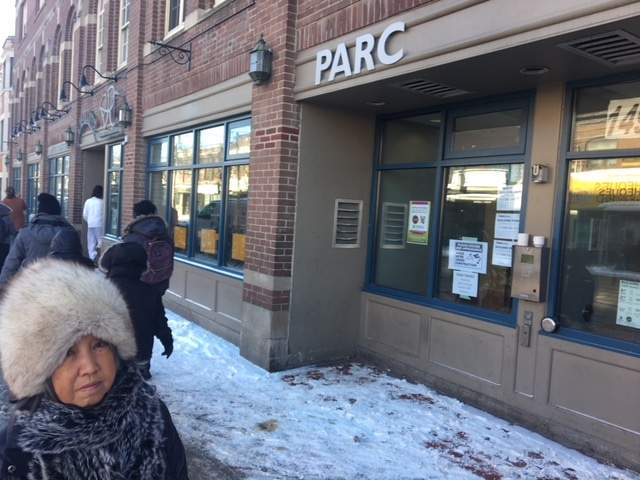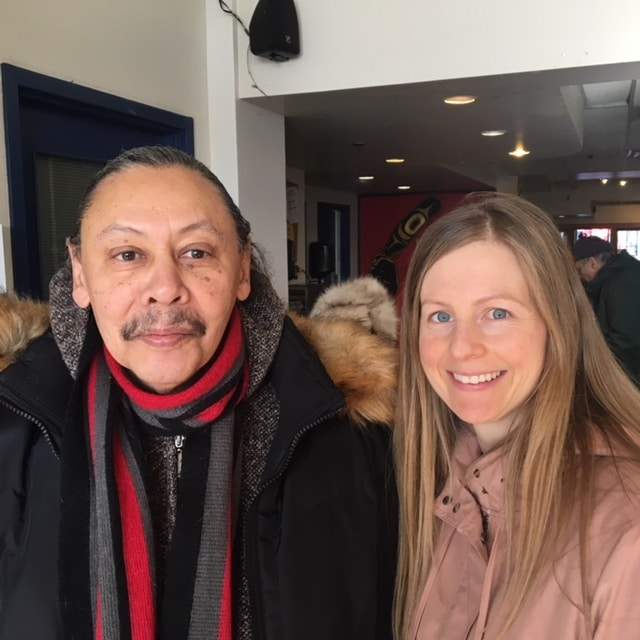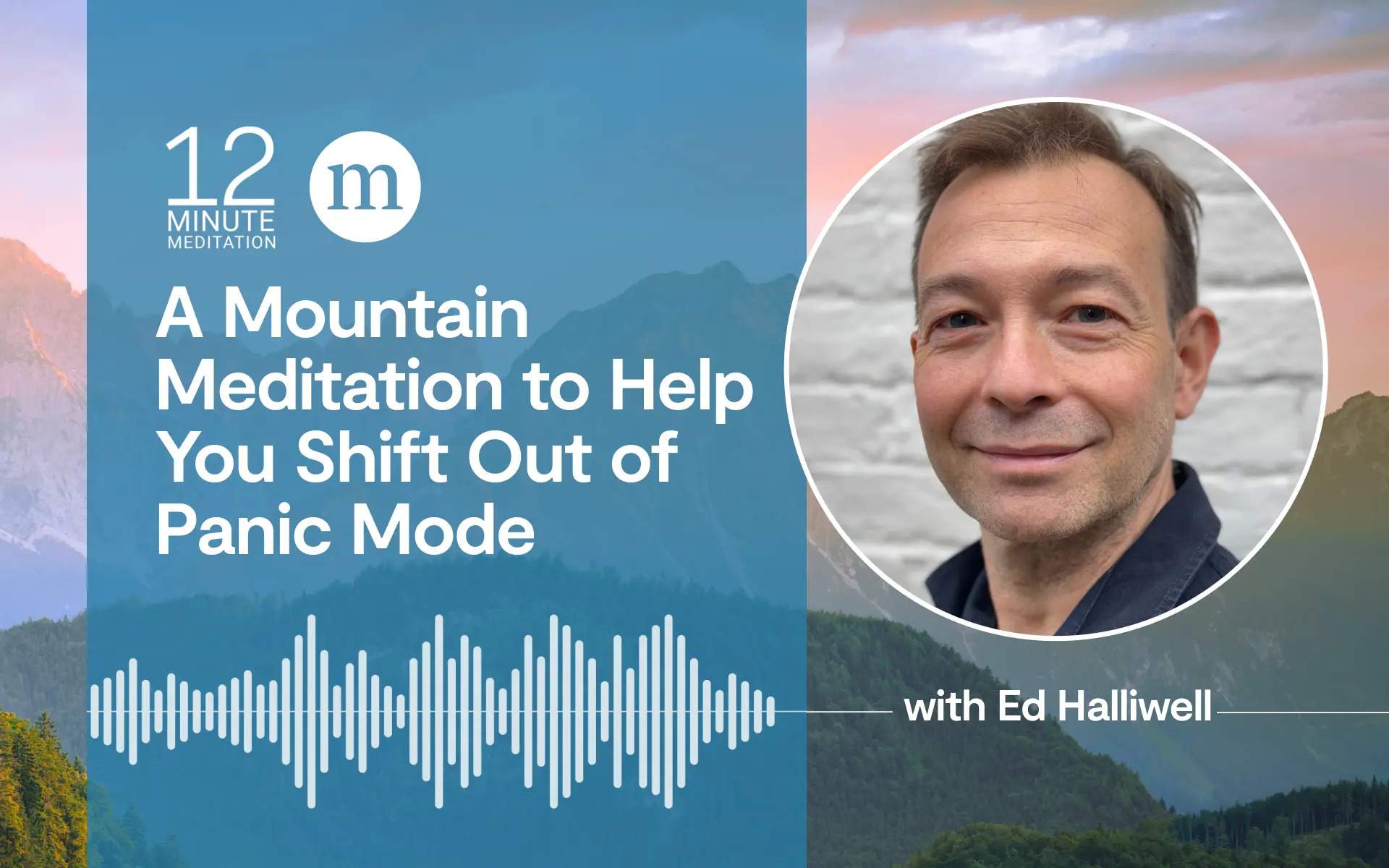In Parkdale, a diverse neighborhood in Toronto’s West End, members of the Centre for Mindfulness Studies’ Community Program work in concert with local community members to help serve those in need of mental health support. The Centre trains frontline workers, who train clients in mindfulness skills, and some of those clients become peer leaders who bring mindfulness skills to others. It’s based on a vision of a community-centric — rather than institution-centric — approach to mental health care.
What community-based public-health looks like
Tita Angangco, pictured below, co-founded the Centre six years ago with Patricia Rockman, MD, and runs the Community Program. Pat, who was busy working with faculty and staff that morning, is in charge of all training and education, and is responsible for the Centre being the premiere place for clinicians in Ontario to be trained in mindfulness. Tita is standing in front of PARC: The Parkdale Activity-Recreation Centre, where homeless and precariously housed people come for a wide variety of services, including mindfulness, a good hot meal, and some companionship.

Tita: “To do mental health work, you have to go to where the people are; you can’t wait for them to come to intimidating places far from home, run by people who appear to be judging them.”
“To do mental health work, you have to go to where the people are; you can’t wait for them to come to intimidating places far from home, run by people who appear to be judging them.”
Here, in PARC’s drop-in room, where oatmeal and bananas are being served, is Leysa Cerswell Kielburger — who is completing her PhD in Clinical Psychology and who specializes in “community-based, culturally-grounded, evidence-based mental health service, including mindfulness-based cognitive and behavioural therapies” — with Terence Williams, a PARC member, peer mindfulness leader, and Community Outreach Worker at PARC. You become a PARC member simply by walking through the door. Terence: “When I get impatient waiting for the streetcar, I practice self-compassion, and repeat phrases to myself like, ‘May I live with ease, may I be free from torment…’, and then I can extend that to others, ‘May you live with ease, may you be free from torment….’”

Another peer mindfulness leader, Shelley LaHay, shows off the t-shirt she got from completing the half-day mindfulness challenge in Toronto last fall. Shelley: “Mindfulness has helped me so much with my anxiety and lack of confidence. When I show people mindfulness, like the 3-minute breathing exercise, I keep it real simple. Mindfulness can be a big complicated word. If you try to be complex, you lose people. If you keep it simple, people actually see the complexity in it, how deep it is.”
Terence, Shelley, and Heinz Klein, another peer mindfulness leader, retire to Pete’s Corner Diner, a greasy spoon across the street from PARC, since the meeting area on PARC’s second floor is being renovated. Heinz: “People get ‘out of breath;’ mindfulness can get their breath back. It has a full body impact. If we just have little peer support pods of 2-3 people that could make a big difference in mental health, in feeling that you are not dependent, but that you can have your independence. That’s not taken away from you.”
Sustaining the front lines
That afternoon and evening on the 46th Floor of the Bay-Adelaide Centre at 333 Bay Street (in the heart of Canada’s Wall Street equivalent), the board of the Centre met in a strategy session to try to figure out how to make the Centre sustainable and flourishing over the next five years. These are the offices of KPMG Canada. All the artwork is original and stunning and plentiful. The views are lofty. The streets are far below.

The board is filled with caring, dedicated, highly accomplished people in the business, education, tech, arts, real estate, marketing, polling, research, non-profit, etc., sectors. (Then, there’s me.) The leadership and staff of the Centre inspire you to the point of tears. Together the Centre’s founders, faculty, staff, and the board are highly motivated to make this thing work, and to make Ontario a showcase for the world in mindfulness-infused, community-based, public-health oriented mental health, and to make mental fitness as important in our society as physical fitness. Paul Woolner, co-chair: “The public health concerns last century were sewage, water quality, hygiene. While these always remain concerns, the public health focus in this century is behaviour and lifestyle. How do the ways we behave and interact as communities make us sick or promote our wellness?”
At the end of the meeting, the board chair — Jeff Smith, COO of KPMG Canada’s Global Advisory division — volunteered to head up the evaluation of all new opportunities for the Centre’s growth, in his “spare time,” in consultation with a few other board members and centre leadership. “We will pick the one’s that make most sense for us, we will figure out how to go after them, and we will win them.”
All photos were taken on Barry’s visit on to the Centre for Mindfulness Studies on Tuesday, January 30, 2018








